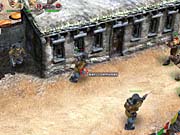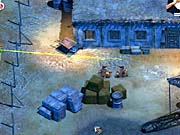Grom is billed as an action role-playing game, but it's hardly either. Its only similarity to action games is the fact that you have to repeatedly click on the enemy to attack, and its only connection to role-playing games is its use of dialogue trees. In reality, Grom is more of a real-time strategy game, albeit one with frustrating controls and terrible artificial intelligence.

Those who have studied the history of the world according to computer games already know that the Nazis invested a great deal of time and manpower combing the globe for doomsday devices from the ancient world. To these erudite game players, the plot of Grom will seem like one-upmanship. Or, more precisely, "eleven-upmanship." According to Grom's story, there are not one, but 12 of these Armageddon artifacts located in Tibet, which seems like little more than overzealous contingency planning.
You control the thick-mustached Colonel Grom and his various cohorts as they try to put a stop to the Nazi plan. Or rather, you try to control him in spite of the game's relentlessly frustrating mechanics. The basic premise of Grom's gameplay--which resembles the gameplay featured in the action RPG Diablo, but with guns--isn't a bad one, but you know a game is in trouble when you find yourself forced to repeatedly play through your battles.
Most of the trouble seems to arise from the fact that the game's interface is totally inadequate. For instance, you can pause and issue orders to your units, but you can only issue movement orders or change their weapons, even though it'd be most useful if you could issue attack orders while paused. In another example, you use the left mouse button to issue an attack order, but you also use that button to move, which means that your units are often running around when you want them to be firing. Enemies have the annoying habit of running around willy-nilly once they're hurt, so when you try to click on them to target them you instead end up running in their footsteps all over the map. This wouldn't have been a problem if your selected units did anything on their own. Units that you have not selected have default behaviors and will attack or defend on their own, but the instant you select a unit, it won't budge without your say-so. This may not sound like much of a problem, but you'll probably find it ridiculous that selecting a moving unit causes him to stop dead in his tracks or simply stand still while the enemy merrily pummels him into oblivion.
Luckily, it's pretty difficult to actually die in Grom. More often than not, when a member of your team gets low on health, he simply falls unconscious, waking up after a short amount of time passes. When your entire team falls unconscious, enemy units will just wander away, apparently satisfied with the idea that the men they were just trying to kill are quietly napping. Not that they could finish you off even if they wanted to, because in Grom, unconsciousness is the same as invulnerability. A grenade can go off next to an unconscious unit and he won't even get a bruise.
Your units will fall unconscious fairly often, because the game's combat is difficult. Not only must you struggle against the game's interface, but you are also usually outnumbered and outgunned. And because there are no real tactics or strategy involved, the combat isn't very satisfying. You can't use environmental objects to your advantage, so those gas tanks in the Nazi camps will just sit there undisturbed throughout a heavy firefight. And while Grom has all the appearances of a tactical game, including the ability to lie prone and crouch, you mostly just run around and exchange fire with the enemy until one of you is dead.
One of the game's more frustrating elements is the fact that you cannot leave a map until the enemy is eliminated. An early mission requires you to sneak into a Nazi camp and steal some documents, but while you can sneak around to your heart's content, you can't actually leave the camp until you've killed everyone. This is also frustrating when you enter a map, only to find yourself outnumbered and without a means of escape. What's worse, you can't actually have your party stop and rest as you would in a traditional role-playing game, so your units recover from damage only through the use of healing items, which are costly and somewhat rare.

Other than combat, the game consists of lengthy dialogue sequences that are poorly translated and therefore largely nonsensical. Frequently, you'll be presented with a two-option response tree where it's impossible to tell what the responses mean, let alone make a guess at what effect they'll have. There is also a bargaining game that's entirely optional and equally frustrating. Your characters have bargaining cards that represent reactions to the other participant's cards. You must choose your cards, which represent attitudes like "angry" or "insulted," and then enter the bargaining round, where you play cards in response to your opponent. It's a guessing game, because you don't know what cards he'll play and, even if you did, it's unclear how each card affects the others. Usually, it's best just to take the default price for whatever it is you're bargaining for and move on.
Grom has a number of frustrating elements, and it doesn't offer much of anything to make up for them. In the end, the game's problematic interface makes it too complicated to be mindless fun, and the combat itself is too mindless to have any strategic depth.